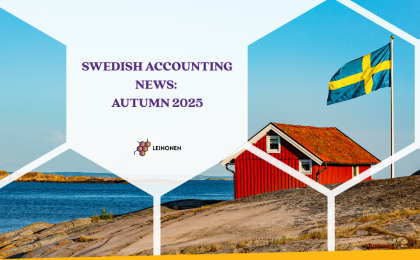The Swedish Accounting Standards Board (BFN) have been reviewing the Generally Accepted Accounting Principles (GAPP). In 2025, proposed changes to K regulations will affect many companies accounting in Sweden that currently use K2 or K3.
K2 and K3: What are They?
K2 and K3 are two of four ‘K regulation’ categories used for annual reporting in Sweden. A company’s size and operations affect which categories they are able to use for their annual accounts. K2 and K3 are the most commonly used.
- K2 is used by smaller companies with simpler operations. These companies must earn less than SEK 80m in annual revenue.
- K3 is for consolidated accounts and legal entities. Companies using K3 are typically those that have more than SEK 40m in total assets, generate more than SEK 80m in annual revenue, and have an average of 50 employees. However, smaller companies that are not eligible for K2 must also follow this standard.
Under current regulations, a smaller company can choose to report in accordance with K3, but larger companies cannot choose to use K2.
What Changes are Being Proposed by The Accounting Board?
A number of changes are being proposed, mostly affecting companies currently using K2. While the smallest businesses exempt from auditing will be able to continue using K2, the ultimate goal is for more companies to move to K3.
The following companies currently using K2 will soon be required to use K3:
- Those with significant deferred tax items or buildings with varying useful lives.
- Condominium associations (regardless of size), to ensure fair and comparable accounting.
- Companies of any size that have at least one foreign branch.
K2 regulations will also be refined and clarified where needed.
These clarifications and changes include:
- Clearer rules on what should be included in the ‘raw materials and supplies’ item.
- Clarifications on when shareholder contributions can be reported.
- Clarifications on the accrual of rent.
What Does This Mean for Businesses Accounting in Sweden?
Businesses currently using K2 that do not have an accounting consultant will need to reassess whether they still have simpler conditions that allow them to continue using K2 (e.g., not having one or more foreign branch). If it is determined that the company needs to start using K3, preparations should be made for this shift.
When Will the Changes Come Into Force?
A final decision is expected to be made during the second quarter of next year, and changes will likely come into force for financial years after December 2025. Now is the perfect time to find out how these proposed changes will affect your company, and start preparing for a smooth and swift transition.
How can Leinonen Help With Accounting in Sweden?
Adapting to ever-changing accounting regulations like those proposed for 2025 onwards can be both confusing and time consuming, and this is especially true for foreign-owned businesses. Leinonen’s experts have been supporting foreign businesses accounting in Sweden for upwards of ten years, ensuring they conform to current regulations and seamlessly assimilate with new ones.
Outsourcing payroll and accounting in Sweden can boost growth, prevent avoidable hassles, and even reduce costs. Get in touch today to arrange a virtual meeting with one of our staff experts.





